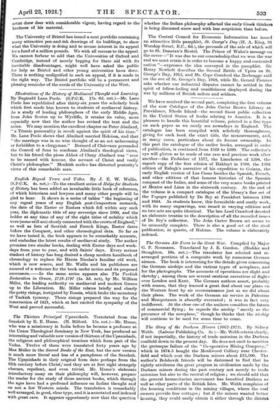The Thirteen Principal Upanishads. Translated from the Sanskrit by R.
E. Hume. (H. Milford. 15s. net.)—Mr. Hume, who was a missionary in India before he became a professor at the Union Theological Seminary in New York, has produced an interesting and valuable new version of thirteen of the Upanishads, the religious and philosophical treatises which form part of the Vedas. Twelve of these were translated forty years ago by Max Muller in the Sacred Books of the East, but the new version is much more literal and less of a paraphrase of the Sanskrit. The Upanishads in their original form date perhaps from the fifth century before Christ,4 and they are at first sight strangely obscure, repellent, and even trivial. Mr. Hume's elaborate introductory essay on their philosophy will, however, prepare the reader for the study of these ancient books, which through the ages have had a profound influence on Indian thought and on not a few Western minds. The translation is remarkably well arranged, in good, clear type, and it is annotated and indexed with great care. It appears opportunely now that the question
whether the Indian philosophy affected the early Greek thinker is being discussed anew and with less scepticism than before.


































 Previous page
Previous page